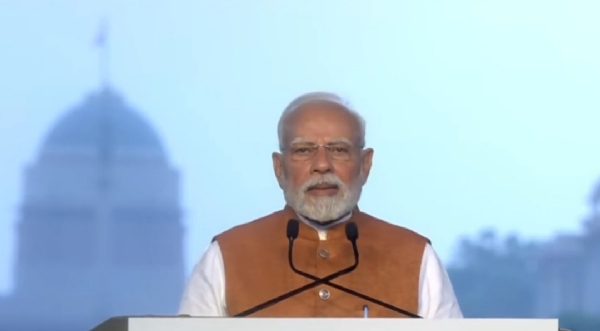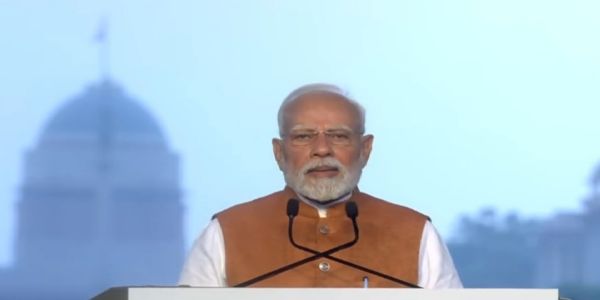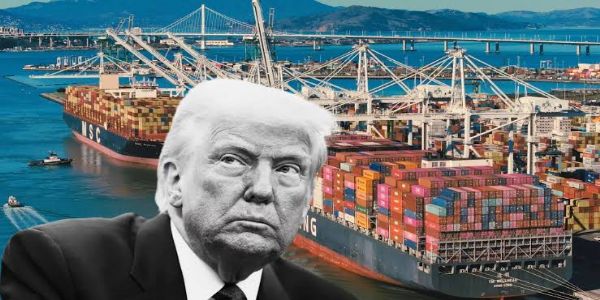
Delhi, 6 August (H.S.): Prime Minister Narendra Modi inaugurated Kartavya Bhavan-3 at Kartavya Path, New Delhi today,emphasizing its significance as a historic milestone ahead of Independence Day. He noted that India is currently achieving key developments in the quest for a modern nation, referencing recent infrastructural projects including Kartavya Path, the new Parliament Building, new Defence Offices Complex, Bharat Mandapam, Yashobhoomi, the National War Memorial, and the statue of Netaji Subhash Chandra Bose. He stated these constructions are not merely infrastructure but institutions where policies for a developed India will be formed in the Amrit Kaal, shaping the country’s future.
PM Modi explained that the name 'Kartavya Bhavan' reflects deep contemplation, as both Kartavya Path and Bhavan embody India's democratic spirit and Constitution. He referenced the Bhagavad Gita, citing Lord Krishna's teachings on duty beyond self-interest, stressing that 'kartavya' encapsulates India's action-oriented cultural philosophy. Modi portrayed Kartavya as a foundation for realizing the dreams of the citizens of India, describing it as the force that channels aspirations, efforts, and compassion towards the preservation of rights for all. The Prime Minister elaborated that every action done with devotion towards the nation is Kartavya, portraying it as a spiritual principle binding citizens to a common purpose.
Shifting focus to the historical context,PM Modi acknowledged that India's administrative machinery has long been based in colonial-era buildings that often provide inadequate working conditions. This includes the Ministry of Home Affairs, which has operated for nearly a century from a single, unsatisfactory building. He pointed out that numerous ministries currently operate from different locations, often in rented spaces. Notably, the annual expenditure on rental costs for these scattered offices amounts to ₹1,500 crore, highlighting both financial and logistical burdens due to employee movements between various locations. Modi noted that this disorganization hampers administrative efficiency, directing attention to the need for modern infrastructure that meets 21st-century requirements.
He emphasized the necessity for technologically equipped structures that promote decision-making efficiency, employee comfort, and service delivery facilitation. The construction of Kartavya Bhavan and its surrounding complexes is part of a comprehensive vision for modernizing infrastructure. With the completion of the initial Kartavya Bhavan, more such buildings are underway. This development promises beneficial changes for employees, who will have improved work environments alongside essential amenities, while simultaneously cutting down the significant rental costs.
PM Modi hailed the new infrastructure as a reflection of India’s ambition on the global stage, indicating that the vision being presented internationally is also being integrated domestically. He brought attention to initiatives like Mission LiFE and 'One Earth, One Sun, One Grid', which represent hope for a sustainable future. He highlighted that Kartavya Bhavan, equipped with rooftop solar panels and advanced waste management systems, symbolizes a commitment to environmentally sustainable practices, aligning with the larger vision for green development across the nation.
Highlighting that government development efforts span all parts of India, he pointed out significant projects like the new Parliament, the construction of over 30,000 Panchayat Bhavans nationwide, four crore pucca houses for the less fortunate, the establishment of the National War Memorial and Police Memorial, and the development of more than 300 new medical colleges. Additionally, Modi remarked on the construction of Bharat Mandapam and the advancement of over 1,300 Amrit Bharat Railway Stations, alongside nearly 90 new airports developed over the last 11 years. The narrative indicates a strong focus on transformative changes, aligning with the broader vision of nation-building that Modi advances through these infrastructural initiatives.
PM Modi discussed the intrinsic link between rights and duties as articulated by Mahatma Gandhi, stating that fulfilling one's duties bolsters the foundation of rights. He emphasized the mutual responsibility of citizens and the government, asserting that serious fulfillment of governmental duties enhances governance. He described the last decade in India as one marked by significant strides in Good Governance, attributing this progress to a framework of reforms. According to Modi, the ongoing reforms in India are both consistent and visionary, aimed at improving government-citizen relations, enhancing ease of living, prioritizing the underserved, empowering women, and improving administrative efficiency.
He highlighted the JAM Trinity—Jan Dhan, Aadhaar, and Mobile—as a crucial component in making government schemes in India transparent and reducing corruption. Modi shared that approximately 10 crore fraudulent beneficiaries, whose existence was unverifiable, have been eliminated, which has saved the country around ₹4.3 lakh crore. The savings are being redirected toward developmental projects, thereby satisfying genuine beneficiaries and protecting national resources.
Addressing issues beyond corruption,PM Modi pointed out that outdated regulations had historically impeded governance. He noted that over 1,500 antiquated laws have been repealed, allowing for streamlined governance. Furthermore, he indicated that more than 40,000 compliance requirements have been eliminated over the past 11 years, reducing burdens on citizens. He acknowledged that overlapping responsibilities among government departments previously caused delays and proposed the integration of several departments to improve efficiency. The creation of ministries dedicated to specific sectors, such as the Ministry of Jal Shakti and the Ministry of Cooperation, showcases this effort.
PM Modi introduced initiatives aimed at enhancing governmental work culture, such as Mission Karmayogi and digital platforms like i-GOT, which provide training to government employees. He mentioned modern systems like e-Office and digital approvals as catalysts for more efficient and accountable administrative processes. He urged officials to approach their duties with renewed enthusiasm, leveraging their positions to make impactful contributions to the nation. He stressed the importance of understanding the significance of each file and grievance, recognizing that even small delays can have extensive repercussions for citizens.
The Prime Minister called for introspection, noting that while other nations that gained independence around the same time have advanced more rapidly, India must now focus on overcoming historical challenges. He expressed pride in the achievements over the past years, stating that 25 crore citizens have been lifted out of poverty. Modi expressed a commitment to erasing poverty entirely and realizing a developed India. He rallied stakeholders to contribute towards making India the world's third-largest economy and optimizing national productivity.
He underscored that successful nations maintain their positive legacies, and India's approach should be one of balancing progress with heritage. Following the inauguration of Kartavya Bhavan, PM Modi announced the transformation of the North and South Blocks into a public museum named “Yuge Yugeen Bharat Sangrahalaya, allowing citizens to engage with India's civilizational heritage.
The inauguration event was attended by Union Ministers, Parliamentarians, and other dignitaries, marking a significant milestone in the government's modernization and citizen-centric governance initiative. Kartavya Bhavan - 03 is part of a broader transformation of the Central Vista, designed to create a more efficient administrative framework. This new complex aims to enhance inter-ministerial coordination, accelerate policy implementation, and foster a responsive administrative environment.
In contrast to many key ministries operating from outdated buildings constructed between the 1950s and 1970s, Kartavya Bhavan - 03 is set to optimize government function. The facility spans approximately 1.5 lakh square meters and will host several crucial ministries. Its design will promote innovation and collaboration, featuring modern governance infrastructure with IT-ready secure workspaces and advanced systems for sustainability. Targeting a GRIHA-4 rating, the building will incorporate double-glazed façades, solar energy sources, and efficient HVAC systems alongside rainwater harvesting capabilities.
Hindusthan Samachar / Jun Sarkar








